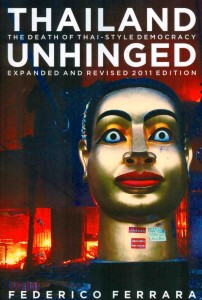 This book has been banned in Thailand, and it’s easy to see why. It takes on the ruling class, the monarchy, and to a certain extent, denigrates the Thai people as well. With his Thailand Unhinged: the Death of Thai-Style Democracy (2011, ISBN 978-979-3780-84-9), author Federico Ferrara notes in his foreword that he’d self-censored his earlier edition in order to avoid being arrested and thrown in jail while traveling in Thailand. This is a genuine concern, in light of Thailand’s draconian lèse-majesté laws. He goes on to note that with the new edition, he pulls no punches, and states that he’s essentially given up his freedom to travel to Thailand.
This book has been banned in Thailand, and it’s easy to see why. It takes on the ruling class, the monarchy, and to a certain extent, denigrates the Thai people as well. With his Thailand Unhinged: the Death of Thai-Style Democracy (2011, ISBN 978-979-3780-84-9), author Federico Ferrara notes in his foreword that he’d self-censored his earlier edition in order to avoid being arrested and thrown in jail while traveling in Thailand. This is a genuine concern, in light of Thailand’s draconian lèse-majesté laws. He goes on to note that with the new edition, he pulls no punches, and states that he’s essentially given up his freedom to travel to Thailand.
He makes a number of salient points in this 180 page book. In addition to the aforementioned laws, he excoriates both the recent Thaksin and Abhiset regimes, discusses their relationships to the ruling classes, and issues a call for expanded democracy. He also provides insight into the Thammasat University slaughter of 1976 as well as the Red Shirt demonstrations of 2010.
We here at WoWasis, though, have a real problem with his Chapter 4, Thailand For Sale, which is simplistic on many levels and so vituperative and embittered in its anger that the objective reader may very well question his analysis in other chapters. Quoting Ferrara:
Soi 4, just off Sukhumvit Road, has all the gloss and silky smoothness of a chunk of pulsating, raw flesh. The uniquely Thai blend of fermenting piss, rotting compost, exhaust fumes, and burnt-out cooking oils is only rendered more asphyxiating by the cheap incense smoldering by the ubiquitous makeshift shrine. Steam rises from the roadside food- stalls that cramp the narrow, potholed sidewalk; it is with difficulty that it finally dissipates into the thick, damp air. A bewildering lineup of dead animals on a stick lie on display on pushcarts, alongside tropical fruit whose freshness has long evaporated on the foggy plexiglass shielding it from the flies and the dust. Whole roasted chickens sit on bare tables next to fake eyelashes and make-up, flanked by rows of size-zerotank-tops and lingerie. Typically most transfixing to new- comers and repeat offenders alike, however, is the repugnant assortment of deep-fried crickets, roaches, locusts, and other bugs sold here by the bagful.
Nana Entertainment Plaza – in much of the country, the “entertainment” serves as a euphemism for anything designed to end in ejaculation – is a disheveled three-story bazaar of cascading go-go bars, glaring red neons, and mildewy rooms rented out by the romp. Acts of unutterable depravity are committed or tentatively agreed upon here. Menseeped through the bowels of every first world society all the way down here to feast on a banquet of oriental game. Barely post-pubescent, bronze-skinned metrosexuals join limp septuagenarians carrying lifetime supplies of indispensable hard-on pills. Veteran sex fiends wear as decorations from previous, valiant campaigns t-shirts acquired in places as far flung as Cambodia, the Philippines, Brazil, Costa Rica, the Dominican Republic. Most belong to the thick sludge of balding middle-aged men, tourist and expatriate alike, flaunting their trademark deformity – guts swollen from a lifetime of the old lady’s home-cooking and an eternity spent lounging in the slothful comfort of a livingroom couch.
Ferrara doesn’t care much for the women, either: “a twenty-something Thai hooker — a true Siamese cat eager to suck cocks no matter how puny, wrinkled, or flaccid…And the erotic shows… where ugly women use mangled vaginas to smoke cigarettes, play the trumpet, or shoot darts into balloons fifteen feet away…”
Ferrara’s writings on these subjects descend into unfactual, acerbic rants that make us question his powers of observation as well as his cultural understanding of Thailand. For one thing, Soi 4 doesn’t smell like urine. Ever. There are restrooms in every one of the dozens of bars that line the street. The “repugnant assortment” of bugs is a staple of Isaan cuisine, and doesn’t include cockroaches, called “meng sab” in Thai. They’re actually water bugs, “meng da.” And Thais are famous for liking their meat on a stick. We wonder if the author has ever eaten satay. We further ask what “unutterable depravity” Ferrara alleges to have seen in Nana Plaza; we haven’t witnessed any. There are lots of go-go dancers and lady boys, maybe that’s what he means. Perhaps the act of watching bikini-clad dancers is his definition of depravity. He doesn’t like “balding middle-aged men,” either. Maybe he’ll become one himself one day. In terms of “ugly women” with “mangled vaginas,” did he really get close enough to examine one? Or is he hiding a degree in Gynecology that wasn’t divulged in his book bio?
Even though there’s lots of thought-provoking political material in the book, we think it’s best that Ferrara doesn’t return to Thailand. He apparently doesn’t like the food, the women, fellow expats, or much of anything else. He’ll be happier elsewhere. For another banned book that we think offers a more scholarly perspective on Thai politics and the Monarchy, we’d instead recommend Paul Handley’s The King Never Smiles.
Perhaps Ferrara’s bitterness will subside with age, and he’ll write yet another revision. Chapter 4 isn’t necessary, and detracts from the political analysis that forms the major part of the book. For now, you’ll have to settle for the second edition. Buy it here at the WoWasis eStore.
Leave a Reply